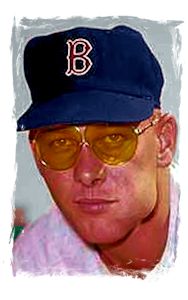 |
Arnold Earley was born on June 4, 1933, in Lincoln Park, Michigan. He played baseball at Lincoln Park High School and was signed by the Boston Red Sox in July 1952. He was invited to Ocala, Florida, in the spring of 1953, and pitched for the Roanoke Red Sox, but he didn’t pitch much. He later moved to Greensboro (also a Class-B team), but pitched only rarely. He was called to military service, entering the United States Army in December 1953, and discharged in December 1955. He was kept from going overseas so he could pitch for the camp baseball team. The Red Sox asked him to pick up where he had left off, and he put in another season with Greensboro in 1956. But his season came to a quick conclusion in July when he fractured his left leg. Arnold advanced to Class-AA for 1957 and held his own, with the Texas League’s Oklahoma City Indians. In 1958 he pitched for the Double-A Memphis Chicks and also pitched in two games for the Triple-A Minneapolis Millers. In 1959, he was, in fact, assigned to Single-A ball, and pitched for the Allentown Red Sox. Arnold did get called up to the big leagues in September 1960, after working the season for the Indianapolis Indians (Triple A, American Association). The Sox were pretty solidly in seventh place and his debut came at Fenway Park against the Baltimore Orioles in the second to last game of the season. He split his 1961 season between Seattle and Boston. He’d been treated near the end of spring training for a back problem that had hampered him since 1959 and proved to be a congenital vertebrae problem. He’d been told his baseball career may be over, but training in humid Florida with the Seattle Rainiers at DeLand, rather than with the Red Sox in Scottsdale, Arizona, seemed to help him. He opened the season with Seattle and had also started to wear eyeglasses, which might explain his improved strikeouts-to-walks ratio. The Red Sox played an exhibition game against the Rainiers in Seattle and he held them scoreless for six innings earning a shot at the majors. He was brought to Boston at the very end of June. He appeared in 33 games, closing 22 of them and earning seven saves. His pitching suited the needs of the Red Sox and for the next four seasons, Arnold was in the big leagues. There was optimism heading into 1962, but it was the year he struggled the most with a 5.80 ERA. Dick Radatz stood out among Red Sox relievers that year, with 62 appearances and a 2.24 ERA while Arnold shared the left-handed reliever duties. In 1963, Johnny Pesky became the manager for the Red Sox. This was the season in which Radatz was dominant. Arnold and Chet Nichols were the two lefties in the pen and Arnold was used more than twice as often. He didn’t live up to Pesky’s hopes, but he excelled in 1964. At the beginning of July, he had an ERA of 1.88 and earned himself the opportunity to try again as a starter. In his fourth start he had to leave the game in the seventh after wrenching his elbow throwing a pitch. It was the last time he pitched that season. It had been his best year however, reflected in his 2.68 ERA. He recovered well and made the staff again in 1965, this time used only in short relief stints. He pitched in 57 games, and his ERA was 3.63. In December, less than six hours before the interleague trading deadline, he was dealt to the Atlanta Braves. Arnold never pitched for the Braves. They assigned him to their Triple-A club, the Richmond Braves, at the start of the 1966 season but then was traded to the Chicago Cubs in May. He pitched in 26 games for the Cubs’ Triple-A team in Tacoma, before being called up to the big leagues again. It was back to the Tacoma Cubs in 1967, until he was traded to the Houston Astros. Houston brought him up from the minors in July and he pitched in two games. But it was his season last in professional baseball. He and the family moved to Flint. Michigan, and from 1969 through 1977, Arnold was employed as a sheriff’s deputy with the Genesee County Sheriff’s Department. In 1977 he had a massive heart attack that pretty much ended his law enforcement career. He eventually took a position with General Motor and worked for A.C. Spark Plug for a while, where he was an inspector. He was also active in his community, with involvement in his church. He also enjoyed golf, and was active with the Flushing Rifle and Pistol Club in Flushing, Michigan, taking part in a number of competitive pistol tournaments and winning a number of prizes. Arnold Earley had suffered a number of health issues after the heart attack and passed away from congestive heart failure, at age 66, on September 29, 1999, in Flint, Michigan. |
|||||
